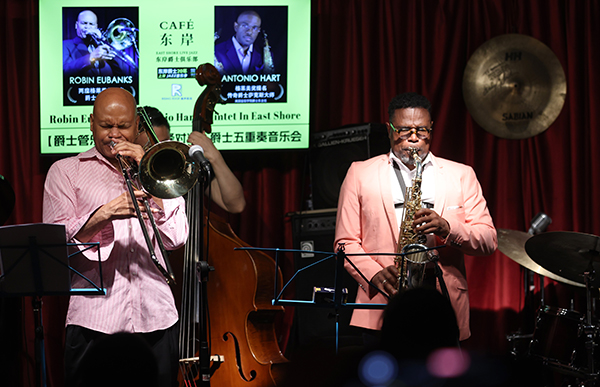

On a warm summer Thursday night in 2006, down a quiet alley by Beijing's Houhai Lake, a guitar trio stepped onto a narrow wooden stage. There was no fanfare and no media blitz; just music.
That night marked the official opening of East Shore Live Jazz Cafe, the brainchild of Liu Yuan, a trailblazing Chinese saxophonist who believed jazz deserved a "real home" in China's capital. Liu Yue, one of the guitarists, remembers the moment vividly.
"I wanted to be the first," Liu Yue says. "Not just to play there, but the first to stake a claim in what Liu Yuan was trying to build — a real jazz club."
From that evening, Liu Yue performed at the cafe nearly every Thursday night for over a decade.
"We didn't know it at the time," he says. "But we were building something far bigger than a gig. We were helping grow the heart of Beijing's jazz scene."
Liu Yuan was a classically trained musician in traditional Chinese music who made a name for himself as a saxophonist for rock icon Cui Jian during the 1980s and '90s.
While his rock credentials were undeniable, his heart had long been drawn to the raw free-flow of jazz.
In the late 1990s, Liu Yuan curated jazz nights at CD Jazz Cafe, one of Beijing's earliest venues to host live jazz. But the venue closed after 10 years.
He then built East Shore Live Jazz Cafe — a place where musicians could jam, audiences were expected to listen, and where music could be lived, not just consumed.
"Jazz must be live," Liu Yue says. "It's about immediacy and feeling. Liu Yuan understood that. He didn't want background music. He wanted a stage."
Liu Yuan turned to jazz not because it was trendy but because it was honest.
For him, East Shore Live Jazz Cafe became an "unofficial school". Young musicians watched, listened, jammed, failed, and learned.
"We didn't have textbooks," confirms Liu Yue. "We had the room. We had each other."
Liu Yue, also a Beijing native, learned to play the liuqin and pipa, both traditional plucked musical instruments, as a child but began playing the guitar as a teenager.
"The reason jazz survived in this city," Liu Yue adds, "is because we had a place to play. Not occasionally, but consistently. That's what keeps music alive".
Liu Yue played across China, at Shanghai's JZ Club and cities in Guangdong and Zhejiang provinces, but always returned to the Beijing cafe.
"The vibe is different elsewhere," he says. "Beijing has this cultural weight and can hold that energy."
As East Shore turns 20, Liu Yue turns 50. And a new generation lines up to play, listen, and learn.
With its low ceilings, intimate space and lakeside location, the venue is not just a home for homegrown jazz musicians but also attracts international musicians.
American saxophonist Antonio Hart, a Grammy-nominated jazz artist and educator, first visited China in 1998 to perform at festivals in Beijing and Shanghai. But it wasn't until his 2011 return that he stepped into East Shore.
"I walked in and felt something sacred," recalls Hart, who teamed up with trombonist Robin Eubanks and some of China's finest jazz musicians, including Liu Yue, for two shows at the venue on July 3 and 4. "It reminded me of the Village Vanguard in New York — small, humble, and utterly serious about the music."
The shows, which were part of the venue's 20th anniversary celebration, sold out fast.